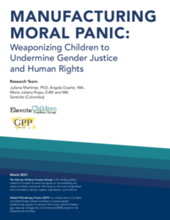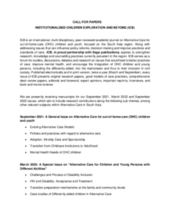Displaying 1061 - 1070 of 4424
This report explores how gender-restrictive groups are using child protection rhetoric to manufacture moral panic and mobilize against human rights, and how this strengthens the illiberal politics currently undermining democracies.
Between March and May 2021 there will be a global consultation with children and young people to feed into the United Nations Committee on the Rights of the Child Day of General Discussion 2021 on Children’s Rights and Alternative Care.
The Care Leavers' Community is hosting a Care Leavers' Cafe on 28 February at 13:30 GMT.
ICB is presently receiving manuscripts for their September 2021, March 2022 and September 2022 issues, which aim to include research contributions along relevant subjects within Alternative Care in South Asia.
This webinar is part of the Alliance L&D Working Group webinar series on Child Protection Capacity Building Adaptations during COVID-19.
This catalogue is an easy-to-use collection of lessons learned from Child Protection innovations and adaptations that were implemented during the COVID-19 pandemic. It is primarily intended for use by Save the Children and partner Child Protection staff at country level.
Family for Every Child has launched a new social network platform for child rights practitioners, called Changemakers for Children (changemakersforchildren.community). Child rights practitioners are invited to sign-up to the platform and join a global movement of local leaders working in children’s care and protection.
This webinar sees global policy makers, donors and implementers explore together how these barriers can be overcome by combining social protection with biomedical support.
This paper examines the academic discourse in child protection research concerning how Article 12 of the CRC is implemented and how it is manifested in child protection service (CPS) casework practices.
In this article, members of the Data for Impact team reflect on how data and a case management information system can help caseworkers and others to better support children without parental care.



